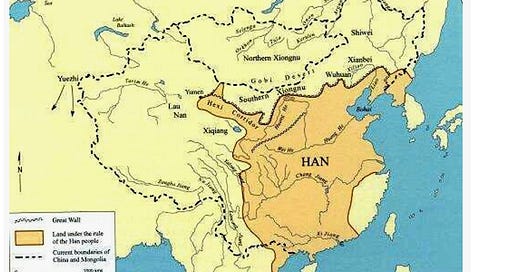Prosperity for the People, Murder & Mutilation at Court: the Heyday of Han Dynasty's China
A History of Mankind (186)
To check all previous newsletters in the History of Mankind, which is pretty long, you can click here.
Han China, pacified after the wars in the Qin-to-Han transition, in the 2nd century BC entered an era of prosperity that would be for ever remembered as worthy of emulation.
The circulation of gold, bronze and – still to a lesser extent – silver currency exploded as peace led to higher grain output and disposable income in the countryside, driving demand for city-made manufactured products and valuable silk, soon China’s most prized export.
This economic boom, boosted by private coinage, was so rapid and evident that it caused significant unease among some China officials, concerned about its destabilizing social effects. Thus, Jia Yi, supported by other officials, argued in favor of banning private coinage on three grounds: first, that allowing private coinage would induce people to commit crimes; second, that without any unified standard of coinage, the monetary system would become more confused; third, that private coinage is lucrative, and this might induce people to give up farming to take on mining copper and minting coin.
Keep reading with a 7-day free trial
Subscribe to A History of Mankind to keep reading this post and get 7 days of free access to the full post archives.




